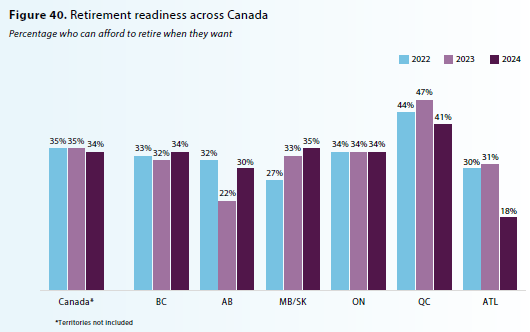Click below to read a backgrounder on how the Seniors’ Tax Credit will work. Campaign Research asked more than 2,000 respondents across Ontario a series of questions in late May 2024. The results overwhelmingly support the implementation of a Seniors’ Tax Credit: 90% of respondents agree that seniors should have a choice as to where they age. 90% of respondents agree that seniors should have a choice of how they receive care. 86% of respondents agree that they would prefer to age at home or in a retirement home and not in a hospital or long-term care facility. Almost 90% of respondents support a refundable tax credit to seniors similar to Quebec’s. Nearly 85% of respondents agree that they would prefer their parents or loved ones to age at home or in a retirement home and not in a hospital or LTC facility.
“Financial challenges can be a tipping point for a premature move to long-term care. Tax credits that enable seniors to stay in their home or retirement home for longer is the best solution for them and relieves pressure on the long-term care system, which currently has a wait list in Ontario of more than 43,000 people.” – Donna Duncan, CEO, “The Ontario Hospital Association (OHA) supports the proposed Seniors Monthly Tax Credit to provide older Ontarians with additional choices and greater flexibility in choosing how and where they age. It would enable more seniors to access home care or supportive services beyond what is accessible through publicly funded programs.” – Anthony Dale, CEO, “Affordability and limited choices are forcing seniors to leave retirement communities or their own private homes prematurely. This tax credit is instrumental to giving seniors more choice and better affordability to stay in their home communities.” – Cathy Hecimovich, CEO, “After a lifetime of making memories in their family homes, many Ontario seniors are ready to downsize, but too many of them can’t afford the limited options available. Expanding the Seniors Care at Home Tax Credit would give Ontario’s growing senior population more flexibility to choose housing options that work for them and help them stay in their communities. It would also incentivize senior-focused development and unlock more housing units for young Ontarians who want to start families. Let’s support the generation that raised us and give them the resources to choose the housing that works for them.” – Rick Kedzior, President, Board of Directors, “Home Care Ontario endorses the expansion of the Ontario Seniors Care at Home Tax Credit which would allow seniors to choose the level of care and services to meet their current needs. We also urge both the federal and provincial governments to eliminate the required disability certificate for the current tax credit, which makes it difficult for people to access the right care, at the right time, in the right place.” – Sue VanderBent, CEO, REALPAC is committed to advancing the long-term vitality of Canada’s real property sector, and to fostering conditions for Canadians to thrive. An expanded seniors’ tax credit in Ontario would empower older adults to make housing decisions that best meet their needs. Additionally, this incentive would encourage more senior-focused developments and help unlock existing homes, thereby increasing availability for younger generations.” – Michael Brooks, CEO, REALPAC Rooted in research The C.D. Howe Institute released a research paper focusing on the need for strategies that support greater affordability for seniors. The paper outlines the need for provinces to implement smart policies to address our growing senior population and economic challenges faced by some seniors, including providing a refundable tax credit for senior renters to access retirement home services that fit their individual needs. In the media The CEO of the Ontario Retirement Communities Association Cathy Hecimovich and StrategyCorp Senior Advisor and Former Premier of Quebec Philippe Couillard joined the Intended Consequences podcast to share their thoughts on how governments can help seniors be in control of their care, including looking towards Quebec’s successful seniors’ tax credit. Decreasing transitions to LTC An enhanced Seniors’ Tax Credit can help more seniors afford to live and receive care in their homes and communities longer, including in retirement homes. New research has revealed that seniors living in Ontario retirement homes are almost 13% less likely to move to long-term care (LTC) homes when compared to their counterparts living at home. These findings support the case for introducing an enhanced Seniors’ Tax Credit in Ontario, which would encourage greater adoption of retirement living for seniors and help relieve pressure on the long-term care system. Success in Quebec For 25 years, Quebec’s successful Tax Credit for Home-Support Services for Seniors has provided an excellent real-world model for how this type of credit works in practice, providing many benefits to seniors and the overall health system. The province’s credit enables more seniors to afford and receive the private care they need, and, in turn, Quebec’s long-term care wait list is 1/7 of Ontario’s waitlist when factoring in the population difference. The solution for Ontario
With Ontario's 80+ population set to double between 2023 and 2040, a Seniors' Tax Credit will enable seniors to live and receive care in their homes and communities longer – saving LTC and hospitals for those who need them most.
Backed by Ontarians
Supporters
The Seniors' Tax Credit is backed by a group of health care, senior living, and real estate organizations in Ontario who understand the vital role it can play in our entire health care and housing continuum.

Ontario Long Term Care Association 
Ontario Hospital Association
Ontario Retirement Communities Association
Ontario Real Estate Association
Home Care Ontario
REALPAC

To further highlight Quebec’s success, the National Institute for Ageing (NIA) released its 2024 annual survey results: Quebec seniors feel very or somewhat more positive about aging compared to the rest of the country—73% in Quebec versus 58% in Ontario (page 86). Additionally, Quebec seniors are better able to afford retirement when desired—41% in Quebec compared to 34% in Ontario (page 58).Get in touch
Questions? Comments? Complete our contact form to learn more.
Contact Us